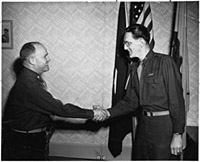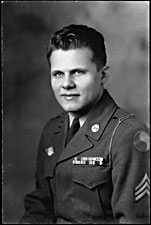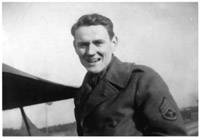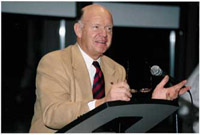|
MBAs
for life
Some
of them graduated more than a half-century ago, but these
alums still retain fond memories of the business school that
grew into Kellogg. They recall how their academic experiences
here changed their lives.
by Beth Warren
| |
 |
| |
At
right: Lieutenant Colonel John Laperre
|
| |
|
The year
was 1949, a year that saw the creation of NATO, the publication
of Orwell's 1984 and the invention of silly putty.
It was also a time when Northwestern University's enrollment
swelled by 30 percent to hit record levels. Students flooded
the campus, thanks largely to the GI Bill, a new program that
rewarded WWII veterans by paying their college tuition.
Many of
those veterans, including John Lapperre, Stanley Bratt (both
’49) and Karl Abt ’48, discovered new opportunities
at the School of Commerce, Kellogg's predecessor founded in
1908 and located in downtown Chicago.
"The business
school was a very different place when I was there," Lapperre
says. "Most of the students were just starting their business
careers. Accounting was the most popular degree, as bookkeeping
was a recognized occupation. I worked full-time and took classes
at night. Wieboldt Hall was the heart of the Business School
back in [those] days, and it still is a strong place for Kellogg."
Coming
home
Lapperre,
who turns 90 next March, has a rich resume. He spent most
of his career with Pullman-Standard, a Chicago manufacturer
of railroad and rapid transit cars, where he retired as director
of planning. He has authored several articles for professional
publications and is an emeritus life associate of the National
Association of Accountants.
During
World War II, Lapperre served as a lieutenant colonel in the
Army and was awarded the Bronze Star Medal for meritorious
service for operations in North Africa and Italy and the Croix
de Guerre avec Etoile de Vermell for exceptional services
rendered in the liberation of France.
Stanley
Bratt like his peers, completed college with the help of the
GI Bill, majored in accounting and graduating with a bachelor's
degree in business administration. He then took graduate business
courses in the evenings at Wieboldt.Bratt remembers intense
competition for admission in the years following the war.
 |
|
|
Sargeant Stanley Bratt
|
|
| |
|
"I was
able to return to Northwestern because I had gone to the [university's]
summer school before being drafted," he says. During his hiatus
from Northwestern, Bratt served as a sergeant in the 69th
Infantry. His unit took over positions after the Battle of
the Bulge and met the Russian forces at Torgau along the Elbe
River.
After
the war, Bratt held accounting positions at Walgreen's, the
real estate firm of McLennan Company and Fleming Sales Company.
"Fleming
was thrilled I was a Northwestern graduate and so I got the
job," reports Bratt, who worked at Fleming for 18 years before
retiring. These days, he maintains a small practice as a tax
accountant.
Karl Abt
is another alum from the post-war boom years. Until recently
handing off the baton, Abt had been the representative for
the class of 1948 for 30 years.
"Before
I was called into service I was working on a chemistry degree,"
Abt remembers. "When I came back three years later, I decided
to go into the business school." Abt was in the Military Intelligence
Service of the army. His team served with a task force built
around an armored infantry battalion in France, Belgium and
Germany.
Abt's
resume includes Oliver Farm Equipment Company, now part of
White Motor Company, Ford Motor Company and Field Enterprises,
Inc. When he retired in 1989 he started his own CPA practice,
which he continues today.
These
alums agree that they received an outstanding education at
Northwestern and still feel connected to the school.
"Wherever
I've been, my Northwestern degree has always been highly respected,"
Abt remarks. "Things we learned there still pertain today."
"My business
degree helped me tremendously," agrees Lapperre, "I went to
Northwestern to establish my career. Up to that point, I had
been a commercial accountant. In the business program, I acquired
not only the tools of my trade, but analytical skills, which
helped me enormously."
Lapperre,
like others of his classmates, has kept close ties with the
school and often stepped in to help.
When the
time came to expand Wieboldt Hall, which now exclusively houses
part-time evening students, Lapperre served on the advisory
board and was instrumental in raising money for the $15 million
renovation project completed in 1998. Similarly, he has remained
active at Kellogg as a member of the Dean's Council, and served
as the Gift Chair for his class during their 50th reunion
where his efforts spearheaded a fundraiser that generated
over $500,000. Lapperre received a Northwestern Alumni Merit
Award in 1983 and a 1996 Kellogg Schaffner Award, given for
outstanding service.
| |
 |
|
|
Karl
Abt in Belgium, 1944, before the Battle of Ardennes
|
| |
|
Saying
thanks
Wade Fetzer
’61, who attended Northwestern's Business School in an
entirely different social climate than the post-war alumni,
shares their feelings of commitment and appreciation to the
school.
"I feel
I dodged the bullets," Fetzer says. "It was after Korea but
before Vietnam. It was a peaceful time. The stock market was
strong. There was no oil embargo, no campus turmoil."
Commercial
banking was one of the most popular fields in business when
he attended. However, Fetzer wanted a career in investment
banking.
"My career
in investment banking is largely the result of some fabulous
professors I had along the way," says Fetzer. "I knew at that
time what I wanted to do, but didn't know how to get there.
Investment banking firms weren't interviewing at Northwestern.
Northwestern wasn't on their radar screens. Now investment
bankers are among Kellogg's best customers! My business degree
gave me the tools and pointed me in the right direction."
Fetzer's
MBA led him to the Goldman Sachs Group, where he became a
general partner in 1986 and a limited partner in 1994. Today,
semi-retired, he's an advisory director at Goldman and spends
most of his time doing community service, including work for
Kellogg where his is chairman of the Kellogg Alumni Advisory
Committee and a recipient of the school's Schaffner Alumni
Award.
"Dean
[Donald] Jacobs asked me to chair the advisory board," explains
Fetzer, who points out that at that time Kellogg did not have
a competitive advisory board structure. Fetzer was instrumental
in recruiting board members and developing a structure.
 |
|
|
Wade
Fetzer, Chairman of the Kellogg Alumni Advisory Committee
|
|
| |
|
"Our function
is to support Don Jacobs in any way he needs, and to work
closely with him on his initiatives," Fetzer says.
In the
last decade, Fetzer believes he and his peers have built a
successful advisory board. Its members, past and present,
are deeply committed to Kellogg, contributing both time and
financial support.
Fetzer
echoes the feelings of many Kellogg alums when asked why he
has devoted so much energy to the business school.
"I'm thankful
for what I got at Kellogg," he says, "and this is my way to
say thanks."
|



